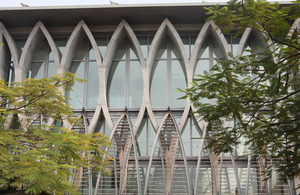DFID Bangladesh moving to new offices to support effective delivery of UK aid
Relocating to environment-friendly offices at the High Commission allows closer working across UK government teams and brings cost savings

Shapla Building, British High Commission Dhaka
On Sunday 10 November, the UK’s Department for International Development will move its Bangladesh office to the British High Commission premises in Baridhara, Dhaka.
DFID Bangladesh Country Representative Sarah Cooke said, “The move to the new Shapla Building underlines the UK government’s commitment to our development partnership with Bangladesh, where we continue to be the largest bilateral grant donor. The cost-effective, environmentally friendly offices in Baridhara will also allow us to work more closely with colleagues in the British High Commission as well as other international donors and partners whilst delivering savings of over £500,000, that’s over 6 crore taka, each year in rent alone.”
The UK aid programme, delivered through the Department of International Development, is directly helping millions of people in Bangladesh. It is lifting 1.5 million of the poorest people out of extreme poverty, improving access to clean drinking water for 1.3 million and adequate sanitation for 2.8 million, getting more children a better quality education, improving family planning and reducing deaths in childbirth, and developing technical skills for more young women and men seeking work.
Further Information:
The last working day at the Gulshan Avenue office will be Thursday 7 November. The new address is as below. Telephone and fax numbers will remain the same.
- DFID Bangladesh, British High Commission, UN Road, Baridhara, Dhaka – 1212
The Shapla Building was named in recognition of Bangladesh’s national flower and the design of the façade. It’s environment-friendly features include solar panelling, that will provide 10% of the building’s electricity supply.
In October 2010 the UK Chancellor George Osborne announced that the UK government would look to co-locate its overseas operations, to join up working across government in each of its 270 posts overseas. A five-pronged approach involves:
- Collaboration – everyone working as one team, supporting each other to achieve their own departmental objectives and those of the UK government as a whole.
- Co-location – of all parts of UK government overseas.
- Regionalisation – through consular and corporate services hubs.
- Consolidation – establishing a single corporate services team in every post.
- Harmonisation – of terms and conditions for UK-based staff serving overseas as well as for locally-engaged staff.